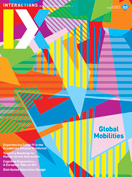Authors:
Angela Okune
This piece touches on a few readings that have helped me think about the continuities and discontinuities in the production of race around the world.
I am currently working on an article for a forthcoming special collection in Engaging Science, Technology, and Society (https://estsjournal.org/index.php/ests), an open access journal published by the Society for Social Studies of Science (4S). The special collection speaks to the importance of TRANSnationalizing Science and Technology Studies (STS) [1]. It will highlight regional groups around the world from a relational perspective in order to situate research in particular contexts and intellectual/social histories, while seeking to avoid "methodological nationalism" [2].
The five contributors have all developed digital exhibits as part of the 2018 4S annual meeting [3]. Now, each contributing team is reviewing the digital exhibit they created previously in order to write about how our scholarship is helping us to rethink place and, vice versa, how place helps us to rethink our scholarship.
Working collaboratively with others in the special issue to discuss our different conceptualizations of place, I have been reading and sharing some works that explore how the construct of race has traveled globally but been experienced differently the world over. I have found Sylvia Wynter's work particularly inspiring, as she traces the epistemic breaks and mutations from the 15th century onward to rethink the origins of different categories of people.
Wynter's work describes how a longstanding history of what constitutes the human, articulated through dualisms (spirit/flesh;rational/irrational), moves from theological terms to the biological [4]. She is driven by the question of why there continues to be an insistent and obsessive degradation of a specific category of humans. She avoids race as a universal category whose terms could be the same for all human groups, instead questioning how the collective and ongoing production of a bioeconomic conception of the human has k produced the systemic inferiorization of one group of people around the world [5].
Pairing this critical work with debates in African Studies about the concept of "Afropolitan" (has been particularly generative for me to think with, especially related to the politics of representation in Nairobi's technology sector. Debates around Afropolitanism have been summarized succinctly already [6,7,8] so I won't reproduce them here. Critiques of the term by Grace Musila [9] and Anna-Leena Toivanen [6] seem to particularly resonate with Wynter's work, which underlines that the only way the West was able to reinvent itself as Man was to invent his other. Musila and Toivanen point out that combining Africa and cosmopolitanism only serves to negate the original meaning of cosmopolitanism by signaling a particular location in the world. Musila provocatively asks, "Why the need to qualify one's cosmopolitanism? The very necessity of qualifying Africans' being in the world only makes sense when we assume that, ordinarily, Africans are not of the world…. [I]n qualifying our belonging to the world, Africans effectively reiterate our non-belonging; our qualified access to a cosmopolitan identity as already marked in particular normative grammars that single us out as wanting—in both senses of the term" [9].
1. You can learn more about the TransNational STS Network at https://stsinfrastructures.org/content/about-transnational-sts-network and join the email listserv through this form: https://bit.ly/transnationalSTS
2. Wimmer, A. and Schiller, N.G. Methodological Nationalism and beyond: Nation—state building, migration and the social sciences. Global Networks 2, 4 (2002), 301–334.
3. See: "Anthropologies of Science and Technologies in Japan" (https://stsinfrastructures.org/content/anthropologies-science-and-technology-japan-0); "Methodological Interruptions Across the Field and Archive: Doing STS in Mexico" (https://stsinfrastructures.org/content/methodological-interruptions-across-field-and-archive-doing-sts-mexico); "STS in Africa in Formation" (https://stsinfrastructures.org/content/sts-africa-formation-1); "Innovating STS in Turkey: Boundaries, Translations, and Temporalities" (https://stsinfrastructures.org/content/innovating-sts-turkey-boundaries-translations-and-temporalities); and "An Archeology of STS in Turkey: Archives, Universities, and Collective Culture" (https://stsinfrastructures.org/content/archaeology-sts-turkey)
4. Scott, D. The re-enchantment of humanism: An interview with Sylvia Wynter. 1999; https://strelkamag.com/en/article/the-re-enchantment-of-humanism-an-interview-with-sylvia-wynter
5. Wynter, S. Unsettling the coloniality of being/power/truth/freedom: Towards the human, after man, its overrepresentation—An argument. CR: The New Centennial Review 3, 3 (2003), 257–337; https://doi.org/10.1353/ncr.2004.0015. For those interested in diving into these topics further, another great entry point into Wynter's rich work is a collective volume edited by Katherine McKittrick: McKittrick, K., ed. Sylvia Wynter: On Being Human as Praxis. Duke Univ. Press, Durham, 2015.
6. Toivanen, A-L. Cosmopolitanism's new clothes? The limits of the concept of Afropolitanism. European Journal of English Studies 21, 2 (2017), 189–205; https://doi.org/10.1080/13825577.2017.1344475
7. Gehrmann, S. Cosmopolitanism with African roots. Afropolitanism's ambivalent mobilities. Journal of African Cultural Studies 28, 1 (2016), 61–72; https://doi.org/10.1080/13696815.2015.1112770
8. Ede, A. The politics of Afropolitanism. Journal of African Cultural Studies 28, 1 (2016), 88–100; https://doi.org/10.1080/13696815.2015.1132622
9. Musila, G.A. Part-time Africans, Europolitans and 'Africa Lite.' Journal of African Cultural Studies 28, 1 (2016), 109–13; https://doi.org/10.1080/13696815.2015.1099424
Angela Okune is a doctoral candidate in the Department of Anthropology at the University of California, Irvine. She studies data practices and infrastructures of research groups working in and on Nairobi, Kenya, in order to explore broader questions of equity, knowledge production, and socioeconomic development in Africa. [email protected]
Copyright held by author
The Digital Library is published by the Association for Computing Machinery. Copyright © 2021 ACM, Inc.








Post Comment
No Comments Found